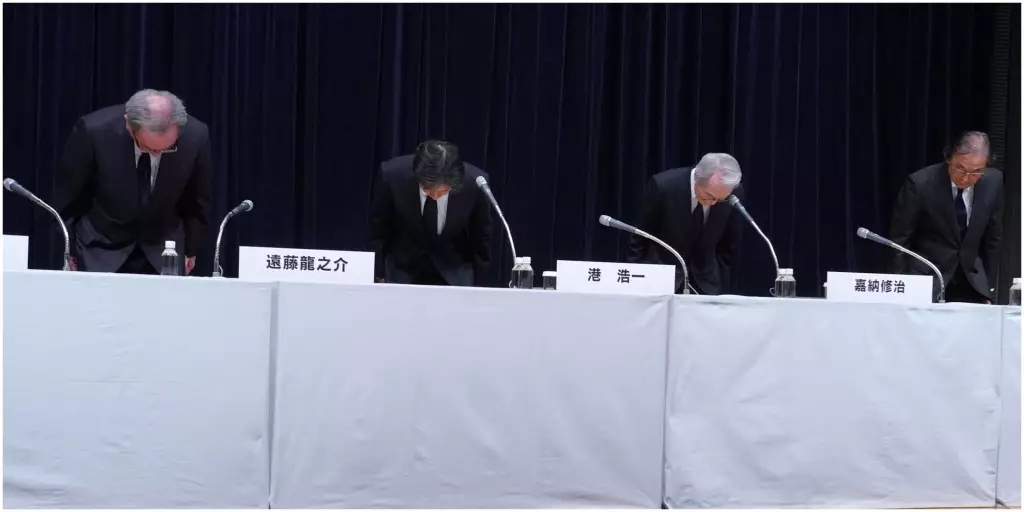In a bold move following a significant scandal, key executives at Fuji Television Network, one of Japan’s leading broadcasters, have resigned amidst a burgeoning sexual misconduct controversy involving former TV presenter Masahiro Nakai. The resignations of Chair Shuji Kano and Koichi Minato, head of Fuji Media Holdings’ television division, symbolize a seismic shift within the organization and highlight the urgent need for ethical reform in Japan’s entertainment industry. Their public acknowledgment of failure during a press conference has sparked a national conversation about the critical failures of leadership, corporate accountability, and the treatment of sexual misconduct allegations.
The uproar began when reports surfaced about Nakai’s alleged involvement in sexual misconduct during a private dinner arranged by Fuji TV staff. Internal documents revealed that Fuji execs had prior knowledge of the allegations but chose to overlook them, citing concerns for the alleged victim’s recovery and privacy. This decision to suppress information in favor of reputation management has not only backfired but also led to significant advertiser pullback from the network, reflecting a profound mistrust that stakeholders now hold towards Fuji TV. This ordeal underlines the pressing reality that ethical oversights in corporate governance can have immediate and far-reaching consequences.
Following the announcement of their resignations, Kenji Simizu was promoted to the position of President. In his first public statements, he made a commitment to “starting from scratch,” aiming to rebuild trust both within the company and among the wider audience. He emphasized a zero-tolerance policy for any violations of human rights, marking a significant pivot from previous leadership’s actions. His approach, while aspirational, will be rigorously tested as he navigates a network reeling from controversy and under intense scrutiny from both the media and the public.
In light of these alarming events, Fuji TV has initiated a third-party investigation aimed at shedding light on the circumstances surrounding the incidents involving Nakai. This committee’s findings, expected by the end of March, are crucial not just for the network’s reputation but for determining the potential implications for similar cases in Japan’s entertainment landscape. The commitment to full cooperation with this investigation represents an acknowledgment that they must put the integrity of the organization above personal relationships and reputational preservation.
This scandal comes against a backdrop of heightened awareness of sexual misconduct in the entertainment sector, often spearheaded by revelations surrounding the late Johnny Kitagawa. As more voices come forward, it is becoming increasingly clear that the industry has been plagued by a culture of silence and complicity. The response from Fuji TV executives is a pivotal moment, indicating a potential transformation in how such issues are addressed moving forward. It could signal a wider cultural reckoning across Japan’s entertainment industry concerning how abuse allegations are treated, offering a path toward more transparent and responsible practices.
The resignation of Fuji TV’s top executives marks a critical inflection point for the network and serves as a wake-up call for the entire Japanese media landscape. The fallout from Nakai’s allegations is not merely reflective of individual misconduct but speaks volumes about systemic issues that have long been inadequately addressed. While Simizu’s commitment to reform is a positive step, it remains to be seen whether this commitment translates into real systemic change. The focus moving forward should not solely be on an investigation but also the establishment of a framework that prioritizes transparency, accountability, and the well-being of individuals within the industry. As the investigation unfolds and the consequences of these events reverberate, stakeholders within the media must brace for a challenging yet necessary journey toward restoring trust and ethical standards in broadcasting.
